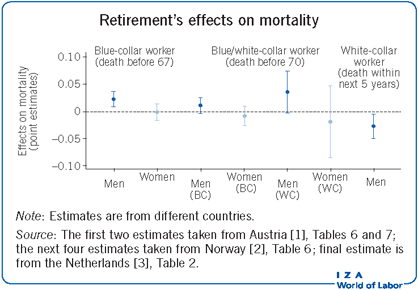Elevator pitch
Retirement offers the opportunity to give up potentially risky, unhealthy, and/or stressful work, which is expected to foster improvements in retirees’ health. However, retirement also bears the risk that retirees suffer from the loss of daily routines, physical and/or mental activity, a sense of identity and purpose, and social interactions, which may lead them to adopt unhealthy behaviors. Depending on the relative importance of the different mechanisms, retirement may either improve or cause a deterioration of retirees’ health, or eventually have no effect on it at all.
Key findings
Pros
Retirement is one of the most fundamental and potentially most disruptive events in an individual’s life.
Methodological innovations and access to large administrative data sets have advanced the credibility of empirical estimates.
Retirement may either be beneficial (e.g. if it is voluntary) or detrimental (e.g. if it cuts all social contacts) to retirees’ health.
The effects of retirement on health work primarily through changes in retirees’ health-related behavior.
Cons
Reverse causality makes it very difficult to establish causality.
The outcome measured and time horizon under consideration are important methodological issues.
The most credible empirical evidence available remains ambiguous.
Due to its ambiguity, it is not possible to derive uniform policy implications from the available evidence.
Individuals react differently to becoming a retiree, depending on both personal and contextual factors.
